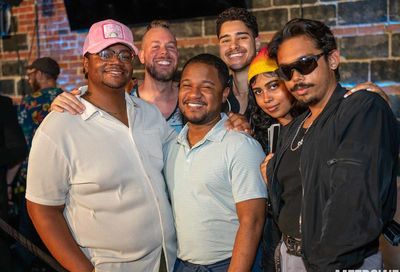Prop. 8 Goes to Court
Appeals judges hear arguments for dismissing, reversing and upholding earlier ruling
On Monday, Dec. 6, the U.S Court of Appeals for the Ninth Circuit heard two hours of oral arguments in Perry v. Schwarzenegger, which was heard before the three-judge panel of Judges Stephen Reinhardt, Michael Daly Hawkins and N. Randy Smith.
The first hour was spent on the question of standing. Proponents of Prop. 8, which ended marriage equality in California, argued that they have standing – even if California Gov. Arnold Schwarzenegger (R) and Attorney General Jerry Brown (D) have both declined to challenge the lower court’s finding that Prop. 8 is unconstitutional – because California courts have recognized that initiative proponents do have the ability to defend challenges to an initiative in state court.
Judge Smith, however, questioned the applicability of that in this case, telling Charles Cooper, who had led the proponents’ team before the trial court, that the relevant California precedent dealt with proponents as agents of the proposition. Here, though, Smith said, they are acting as agents of the state.
The plaintiffs, meanwhile, argued that under federal law the proponents simply do not have the ability to appeal a decision like the trial court’s in this instance.
When David Boies argued for the plaintiffs, Smith asked him if the governor and attorney general ”nullified, in effect” the decision of the voters by not defending Proposition 8 in court. Boies argued that they’re not nullifying it, in that whatever they may think of Prop. 8, they are enforcing it as law. And that, he said, was not sufficient grounds to create standing for Prop. 8’s proponents.
Reinhardt also chimed in, saying, ”Where the governor is not supposed to have a veto … [this] does not seem to [fit] with the initiative system.” Boies countered: ”The fact that there’s no one to defend doesn’t give [the proponents] standing.”
Boies also argued that even if California law gives standing to proponents, that doesn’t necessarily give Article III federal court standing because federal standing is different than state law. Boies also pointed out that the California Supreme Court could have issued a mandate to Schwarzenegger and Brown to defend Proposition 8. But when given the opportunity to do so, the court did not.
The second standing question went to Robert Tyler, the lawyer representing Imperial County, Calif., which has independently joined the proponents of Proposition 8. Tyler comes to the county from Advocates for Faith and Freedom.
U.S. District Court Judge Vaughn Walker, who found Prop. 8 unconstitutional in August, denied Imperial County’s request to intervene at the trial level, and it appeared unlikely that they made much progress toward changing that outcome on Monday. Tyler was unprepared, uncertain even whether the Imperial County clerk was elected or appointed.
The judges heavily questioned whether the deputy county clerk has the ability represent the county and bring action to defend state law.
If Brown, the attorney general of the state – who has not challenged Vaughn’s ruling – represents California’s clerks, Judge Smith asked, how could those clerks have standing themselves? Tyler could only respond that they should have standing because no other government party will defend Proposition 8.
The second portion of the arguments were devoted to the question of Proposition 8’s constitutionality.
Cooper started out by saying, ”This is nothing like the racial restrictions in Loving [v. Virginia] where there was no rational basis whatsoever that could be perceived.”
The U.S. Supreme Court ruled unanimously in 1967’s Loving v. Virginia that laws against interracial marriage were unconstitutional.
Hawkins went right to the meat, asking Cooper, ”If California voters approved a racial segregation proposition, would it be unconstitutional?” Cooper conceded that it would. The difference, when it comes to sexual orientation, Cooper argued, was basically that same-sex couples don’t need marriage – or, at least, that the state needn’t support it – because procreation is always intentional for them.
Reinhardt was skeptical, saying that accidental pregnancies seemed a better argument against divorce than anything to do with marriage equality.
Smith also jumped in, asking what the rational basis is for the marriage exclusion if California is giving ”homosexual couples” everything else. Cooper replied, ”It’s the institution. The word is the institution. … The name of marriage is effectively the institution.”
Ted Olson, speaking for the plaintiffs, told the panel that the Supreme Court has recognized ”the fundamental right of its citizens to marry” – without talking about men and women.
Reinhardt eventually suggested that a ruling limited to the Proposition 8 circumstances – the repeal of an existing right – could be crafted in this case.
Olson concurred, ”You could decide this on the narrow, Romer [v. Evans] grounds.” In that 1996 case, the Supreme Court struck down Colorado’s Amendment 2, which prevented any jurisdiction in the state from recognizing gays and lesbians as a protected class. He added, though: ”I don’t think there’s anything in Supreme Court jurisprudence that doesn’t allow you to look at the broader context.”
Finally, Therese Stewart argued for the San Francisco City Attorney’s Office, stating that California family law treats gay and straight couples the same and that the only basis for what Prop. 8 proponents argue is that allowing same-sex couples to marry somehow ”taints marriage.”
Stewart said the context of the measure and campaign ”was bias,” noting, by quoting earlier cases, that ”prejudice … is not always born of hatred. It may be a simple want of careful reflection.” She ended by telling the court, ”Equal protection doesn’t allow the state to enact a measure based on a belief that some people are unworthy.”
The court will issue its ruling on no specified timeline – although the fact that the court gave the case expedited consideration as to briefing and the scheduling of the oral arguments suggests it is cognizant of the desire for a quick resolution of the case.
Support Metro Weekly’s Journalism
These are challenging times for news organizations. And yet it’s crucial we stay active and provide vital resources and information to both our local readers and the world. So won’t you please take a moment and consider supporting Metro Weekly with a membership? For as little as $5 a month, you can help ensure Metro Weekly magazine and MetroWeekly.com remain free, viable resources as we provide the best, most diverse, culturally-resonant LGBTQ coverage in both the D.C. region and around the world. Memberships come with exclusive perks and discounts, your own personal digital delivery of each week’s magazine (and an archive), access to our Member's Lounge when it launches this fall, and exclusive members-only items like Metro Weekly Membership Mugs and Tote Bags! Check out all our membership levels here and please join us today!























